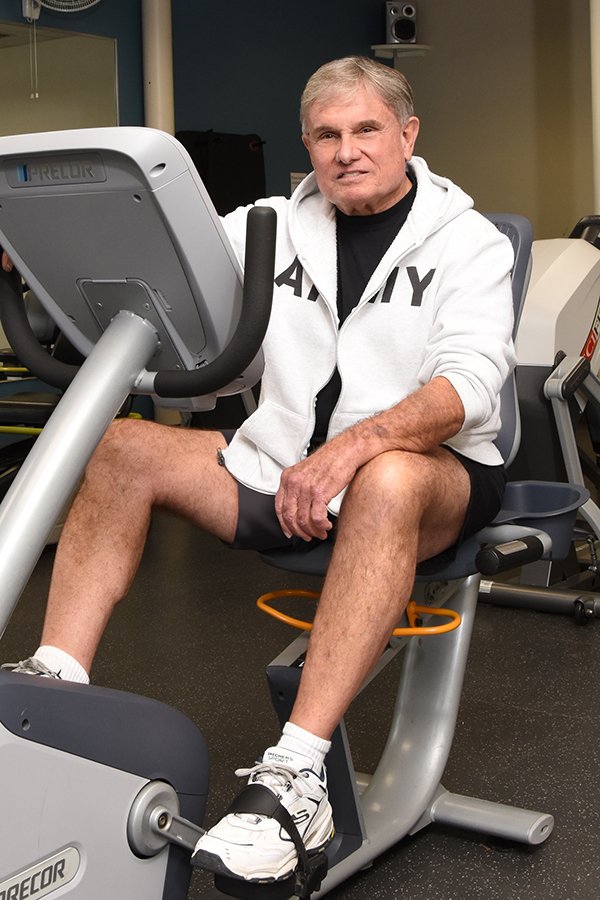Pascual Goicoechea's Story
 It was a nice spring morning in May. I got up, ate breakfast and set about to do some yard work. I started digging a hole in my backyard using a pickaxe. Five minutes into it, I felt a tightness in my chest. I stopped, and the feeling stayed a few minutes, then eased off. I started back digging, and the feeling returned and didn’t go away. My wife, Sharon, looked at me and said my color was not good. She rushed me to the emergency room at Johnston Health’s Clayton hospital. While she parked I went in and told them I was having chest pain. They immediately took me into a room where two nurses hooked me up to cardio equipment. By the time Sharon came in, they had two doctors with me. One was giving me meds while the other explained that they were transferring me to the cardiac cath lab in Smithfield.
It was a nice spring morning in May. I got up, ate breakfast and set about to do some yard work. I started digging a hole in my backyard using a pickaxe. Five minutes into it, I felt a tightness in my chest. I stopped, and the feeling stayed a few minutes, then eased off. I started back digging, and the feeling returned and didn’t go away. My wife, Sharon, looked at me and said my color was not good. She rushed me to the emergency room at Johnston Health’s Clayton hospital. While she parked I went in and told them I was having chest pain. They immediately took me into a room where two nurses hooked me up to cardio equipment. By the time Sharon came in, they had two doctors with me. One was giving me meds while the other explained that they were transferring me to the cardiac cath lab in Smithfield.
When we arrived by ambulance a few minutes later, six nurses and Dr. Hook were waiting on me. They quickly prepped me and did what turned out to be a life-saving cath procedure. Dr. Matthew Hook, the interventional cardiologist who placed a stent in my heart, said my good health likely contributed to my survival. During the procedure, Dr. Hook found the main artery supplying blood to the larger front part of the heart was 99 percent blocked, and another artery was partially closed. The quick actions of my wife, Johnston Health’s Clayton Chest Pain Center crew, and Dr. Hook and his team resulted in me having no permanent damage.
I had dodged bullets before - during my military career, I’d often been in harm’s way. At the invasion of Kuwait during the Gulf War and in Panama during the surrender of Manuel Noriega, as well as following Hurricane Andrew in south Florida where I mounted the U.S. Army’s emergency response from Homestead Air Force Base. But I knew the risks, prepared for them, and thankfully came through them well. But this heart attack was a threat I didn’t see coming. At 73, I thought I was pretty healthy. Annual check-ups at the VA hospital were good. When I retired at 62, I was Chief Of Staff at Fort Bragg where I exercised three mornings every week with soldiers who were one-third my age. I have kept busy and active, gardening and traveling with my wife.
After I left the hospital three days later, the gravity of what happened began to sink in. I had survived what’s called a “widow maker” and with little, if any, damage to my heart muscle. I was fortunate to have dodged another bullet.
While the quick work of the emergency department and heart catheterization lab saved my life, it was the cardiopulmonary rehabilitation team who helped me return to living a full life. In June, I started the program and went to classes three days every week for 36 sessions in all. I was surprised at the various ages of patients, especially the number of young patients. As patients exercised, we were tele-monitored and supervised by staff that included physical therapists, nurses, a dietician and a doctor. That gave me the confidence to push hard. I knew if anything happened, I could get help right away. Just as important, my spirits were buoyed and my confidence was restored by the genuine care I felt from the team. They work well together, love what they do, and are knowledgeable about their field. They were always cheerful. It was a pleasure being looked after by them.
Having a heart attack changes your perspective. It’s brought me back to center, and reminded me of the value of friends and everything that’s good. I’ve written Christmas cards, reconnected with Army buddies and called friends I haven’t seen in 60 years.
I now exercise at Johnston Health’s HealthQuest Fitness & Wellness Center regularly. I have since planted a blackberry bush in the hole I dug last May, and it bore fruit. The deer beat me to the harvest, but it’s all good.
Pascual Goicoechea, Clayton, NC